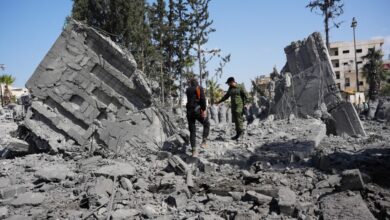Afghanistan peace talks end without Taliban ceasefire agreement
Intra-Afghan talks – the first between government representatives and Taliban insurgents – concluded Tuesday in the Qatari capital with a “roadmap” for a peace deal, but without a ceasefire agreement there was no end in sight to the attacks 2,000 km away in Kabul.
The talks, which were organized by Germany and Qatar, began on July 7 in Doha between members of Afghan civil society, the government and Taliban.
“I congratulate the participants – Afghan society representatives across generations, senior govt officials, Taliban – for finding common ground,” tweeted diplomat Zalmay Khalilzad, the U.S. Special Representative for Afghanistan Reconciliation, after talks ended late Monday with a resolution agreed between the parties.
It's past midnight and the intra-Afghan Conference on Peace just concluded on a very positive note. I congratulate the participants – Afghan society representatives across generations, senior govt officials, Taliban – for finding common ground. pic.twitter.com/eZDBalmj2X
— U.S. Special Representative Thomas West (@US4AfghanPeace) July 9, 2019
The two-page document lays out “points to reach a sustainable peace” in the country which has seen decades of war, including that the parties will “use soft terminologies and words in their official gatherings” and commit “to minimize the civilian casualties to Zero.”
The Norwegian Refugee Council, which has worked in Afghanistan since 2003, said in a statement: “We are pleased to see the commitment by those in Doha to respect schools as well as to reduce civilian casualties. However, these positive words must now be translated into concrete actions by all sides currently fighting in Afghanistan to protect civilians and children from harm.”
The latest quarterly report by the United Nations Assistance Mission in Afghanistan documented a total of 1,773 civilian casualties (581 deaths and 1,192 injuries) between January 1 and March 31 this year.
While it also calls on both sides to “ensure the security” of public buildings – such as schools, markets, hospitals, and dams – the roadmap also affirms women’s rights only “within the Islamic framework of Islamic values.” Women during the Taliban’s five-year rule were forbidden from attending school, serving in the government and security services, and from traveling without a male guardian.
Asila Wardak, a member of the High Peace Council and one of a handful of women among the 70 delegates present in Doha, had said on Monday that the Taliban had spoken about the role of women and minorities in a future political settlement.
Additionally, Wardak said, “everybody is emphasizing on a ceasefire.”
But the talks ended without a ceasefire even as four doctors were reported killed in an overnight attack on a hospital in the Day Mirdad district of Afghanistan’s eastern Wardak province.
Most recently, a massive Taliban car bomb killed and injured dozens of people, including children, near a school in the middle of Kabul on July 1. Six days later, two people were killed and 14 injured in a similar attack in Ghazni province.
Khalilzad did not participate in the talks. President Ashraf Ghani’s government has not been included in negotiations between Washington and the Taliban as the group had refused to directly negotiate with the Afghan government, which it sees as a puppet of the United States.
Any agreement between the insurgents and the U.S. is expected to include the withdrawal of international troops from Afghanistan after nearly 18 years of foreign intervention.












